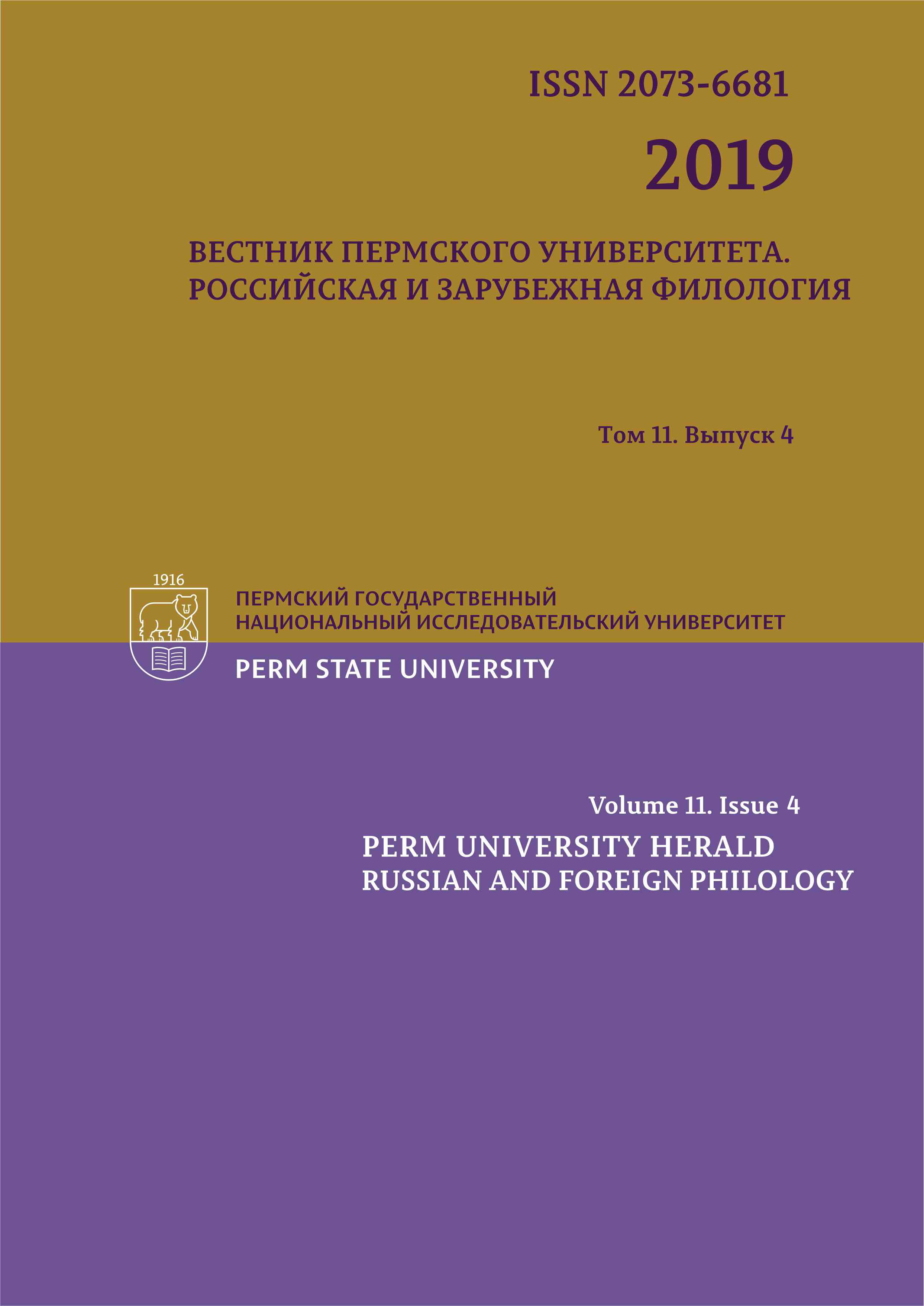VOCABULARY OF MODERN DIALECTS AS AN INDICATOR OF THEIR COMPLEX INTERNAL ORGANIZATION
DOI:
https://doi.org/10.17072/2073-6681-2019-4-16-21Keywords:
dialect lexical units, Samara dialects, areal-typological characteristics, system of dialect vocabulary, inter-territorial correspondence.Abstract
The monographic study Vocabulary of Samara Dialects by T. E. Bazhenova provides a full description of the region’s lexical system. Our article is a review of this book. The history of Samara dialects and the complexity of their formation, the unusual history of the settlement of the region cause objective difficulties in determining the typology of these dialects. When addressing the issues of areal-typological characteristics of Samara dialects, the author of the monograph points to a number of features of the lexical system prevailing in the region. Systematically analyzing the vocabulary of Samara dialects, T. E. Bazhenova identifies numerous thematic groups. Her identification is based on the principles and traditions that have developed in Russian linguistics, in particular in Russian dialectology and areal linguistics, updated in such major scientific projects as Lexical Atlas of Russian Folk Dialects. In addition, the author takes into account the thematic groups that traditionally developed in the dialects of the region and reflect its specificity. Such a multidimensional approach allows a linguist to look at the vocabulary of one territorial entity as an integral continuum. Moreover, Bazhenova uses the principle of consistency not only in the identification of thematic groups but also when considering individual lexical units, their semantics and the relations in which these lexical units are with other elements of the system under study. The author comes to a conclusion that the lexical system can be an indicator of the аreаl-typological characteristics of a group of dialects. The vocabulary of Samara dialects clearly demonstrates the complexity of interlacing dialect traits, genetically marked as opposite and diverse. The monograph is an open study having good prospects for obtaining new results.References
Баженова Т. Е. Лексика по теме «Растительный мир» в самарских говорах // Лексический атлас русских народных говоров (Материалы и исследования) 2013. СПб.: Нестор-История, 2013. С. 21–29.
Баженова Т. Е. Лексика самарских говоров: типологическое и лексикографическое описание. Самара: СГСПУ, 2017. 190 с.
Блинова О. И. Русская диалектология. Лексика: учеб. пособие. Томск: Изд-во Том. ун-та, 1984. 133 с.
Зиброва Т. Ф. Лингвогеографические и экстралингвистические факторы в формировании позднепереселенческих говоров // Лексический атлас русских народных говоров. СПб: Нестор-История, 2014. С. 317–325.
Качинская И. Б. Термины родства и языковая картина мира (по материалам архангельских говоров). М.: Индрик, 2018. 288 с.
Костючук Л. Я. От сомнения к утверждению: роль повторных обследований по программе лексического атласа русских народных говоров // Лексический атлас русских народных говоров (Материалы и исследования) 2008. СПб.: Наука, 2008. С. 8–10.
Красовская Н. А. Лексический атлас русских народных говоров: пересечение лингвистических подходов и парадигм // Вестник Северного (Арктического) федерального университета. Серия: Гуманитарные и социальные науки. 2019. № 2. С. 135–140.
Лексический атлас русских народных говоров (ЛАРНГ). Т. 1: Растительный мир. М.; СПб.: Нестор-История, 2017. 736 с.
Малаховский В. А. Новые данные о говорах Куйбышевской области // Материалы и исследования по русской диалектологии. М.; Л.: ИРЯ АН СССР, 1949. Т. II. С. 217–341.
Нефедова Е. А. Многозначность и синонимия в диалектном пространстве. М.: МАКС ПРЕСС, 2008. 464 с.
Черенкова А. Д. Воронежские диалектные тексты как источник для изучения русского национального языка, истории и культуры народа: учеб. пособие. Воронеж: Полиграф, 2009. 328 с.
References
Bazhenova T. E. Leksika po teme ‘Rastitel’nyy mir’ v samarskikh govorakh [‘Plant world’ vocabulary in Samara dialects]. Leksicheskiy atlas russkikh narodnykh govorov (Materialy i issledovaniya) [Lexical atlas of Russian folk dialects (Data and research)]. St. Petersburg, Nestor-Istoriya Publ., 2013, pp. 21–29. (In Russ.)
Bazhenova T. E. Leksika samarskikh govorov: tipologicheskoe i leksikograficheskoe opisanie [Vocabulary of Samara dialects: Typological and lexicographic description: Monograph]. Samara, Samara State University of Social Sciences and Education Press, 2017. 190 p. (In Russ.)
Blinova O. I. Russkaya dialektologiya. Leksika: ucheb. posobie [Russian dialectology. Vocabulary: Textbook]. Tomsk, Tomsk State University Press, 1984. 133 p. (In Russ.)
Zibrova T. F. Lingvogeograficheskie i ekstralingvisticheskie factory v formirovanii pozdnepereselencheskikh govorov [Linguogeographical and extralinguistic factors in the formation of late resettlement dialects]. Leksicheskiy atlas russkikh narodnykh govorov (Materialy i issledovaniya) [Lexical atlas of Russian folk dialects (Data and research)]. St. Petersburg, Nestor-Istoriya Publ., 2014, pp. 317–325. (In Russ.)
Kachinskaya I. B. Terminy rodstva i yazykovaya kartina mira (po materialam arkhangelskikh govorov) [Kinship terms and language picture of the world (a case study of Arkhangelsk dialects)]. Moscow, Indrik Publ., 2018. 288 p. (In Russ.)
Kostyuchuk L. Ya. Ot somneniya k utverzhdeniyu: rol’ povtornykh obsledovaniy po programme leksicheskogo atlasa russkikh narodnykh govorov [From doubt to assertion: Role of re-surveys in accordance with the program of the lexical atlas of Russian folk dialects]. Leksicheskiy atlas russkikh narodnykh govorov (Materialy i issledovaniya) [Lexical atlas of Russian folk dialects (Data and research)]. St. Petersburg, Nauka Publ., 2008, pp. 8–10. (In Russ.)
Krasovskaya N. A. Leksicheskiy atlas russkikh narodnykh govorov: peresechenie lingvisticheskikh podkhodov i paradigm [Lexical atlas of Russian folk dialects: Intersection of linguistic approaches and paradigms]. Vestnik Severnogo (Arkticheskogo) universiteta: Seriya: Gumanitarnye i sotsyalnye nauki [Vestnik of Northern (Arctic) Federal University Herald. Series: Humanities and Social Sciences], 2019, issue 2, pp. 135–140. (In Russ.)
Leksicheskiy atlas russkikh narodnykh govorov (LARNG) [Lexical atlas of Russian folk dialects (LARFD)]. Moscow, St. Petersburg, Nestor-Istoriya Publ., 2017, vol. 1. Rastitel’nyy mir [Plant world]. 736 p. (In Russ.)
Malakhovskiy V. A. Novye dannye o govorakh Kuybyshevskoy oblasti [New data on the dialects of the Kuibyshev region]. Materialy i issledovaniya po russkoy dialektologii [Data and research on Russian dialectology]. Moscow, Leningrad, V. V. Vinogradov Russian Language Institute of the Russian Academy of Sciences of the USSR Publ., 1949, vol. 2, рр. 217–341. (In Russ.)
Nefedova E. A. Mnogoznachnost’ i sinonimiya v dialektnom prostranstve [Polysemy and synonymy in the dialect space]. Moscow, MAX Press, 2008. 464 p. (In Russ.)
Cherenkova A. D.Voronezhskie dialektnye teksty kak istochnik dlya izucheniya russkogo natsional’nogo yazyka, istorii i kultury naroda: ucheb.posobie [Voronezh dialect texts as a source for studying Russian national language, history and culture of people: Textbook]. Voronezh, Poligraf Publ., 2009. 328 p. (In Russ.)




